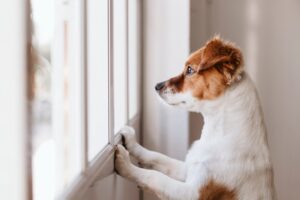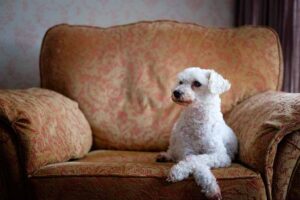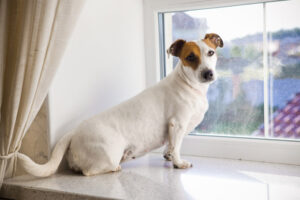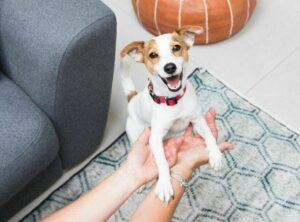Why does my dog sit alone in another room… what are the reasons? If your dog seems to prefer his own company of late, you’re probably wondering why. Even if your pup is the most spoiled, beloved pet, he or she may sometimes behave strangely.
For example, you may wonder, “why does my dog sit alone in another room?” While it may not be common for your unique dog, you may be concerned if your pup prefers solitude. In this guide, we’ll talk about some of the reasons your dog may isolate himself.
Before you scroll down to a more in-depth answer to this guide, “Why Does My Dog Sit Alone in Another Room,” you can check out these other dog-related questions answered by our team at We Love Doodles: Why Does My Dog Lick My Hair and Why Won’t My Dog Go On Grass?
Is It Normal for Dogs To Sit Alone?
The short answer: yes. It’s normal for a dog to sit alone in a room. Just like humans, sometimes dogs may want to just spend time in his own company, in a place where it’s quiet and where he won’t be disturbed.
While it’s normal for dogs to sit alone, try to be mindful of the reasons! For example, is your dog lying and just relaxing, or is he hiding under a bed? Once you identify the reasons your pup wants to be alone, you can care for him and meet his needs.
Why Does My Dog Sit Alone?
That said, if you don’t know the answer to “why does my dog sit alone in another room,” you may not know how to approach it. We’ve outlined a few reasons for this behavior.
1. Your Dog Could Be Enjoying Alone Time
Just like a human, a dog likes to spend time alone when the mood strikes. If your dog is otherwise social, this is nothing to worry about!
If your dog randomly runs off during the day, just let him be. Maybe your dog wants to play in solitude, lie down, or listen to (or ignore) noises. Just like you, your dog needs to decompress sometimes!
Have multiple dogs? That’s even more reason why your pup may want to be left alone. Your dog may have become overstimulated or even just annoyed with his canine playmates.
2. Your Dog Might Be Hearing Strange Noises
Dogs react to different situations and act based on what they feel they should do. For example, they may leave a room alone to avoid the sounds if they hear strange or loud noises. Even if it doesn’t drown out the sound, they may go to a spot where they can’t hear it as loudly.
You can’t always avoid loud noise from, say, construction workers outside your home. However, if you know some loud noise will happen, do what you can to drown out the noise when possible.
You could put a TV in the room where your dog likes to hide and use a stereo or device to play sounds they want to hear. Then, see what makes your dog calm down, and do your best to distract them. While you can’t remove the noise, you can make your dog more comfortable in such circumstances.
3. Your Dog Probably Wants to Sleep
People sleep about eight hours a day with a nap if they feel like it. Sometimes, they forget that different animals have varying physical needs from humans. The same applies to dogs since they can’t get by with only eight hours of sleep daily.
Dogs average about ten and a half hours of sleep daily. However, this is done in “chunks” and not all at once! If they walk over to a room, you may poke your head in to find out if they sleep when they sit alone.
If you know your dog leaves to sleep, leave them alone. Your dog wants to focus on getting good rest, so they go to a quiet area to sleep. Your dog will return to you once they feel rested, so give them some alone time to build up their energy.
Related: Can My Dog Sleep With a Cone On and Why Does My Dog Sleep Between My Legs?
4. Your Dog Might Need to Cool Off
Your dog could face overheating and heat stroke based on where you live. Dogs usually find cooler areas, pant, and drink water when they want to cool off. Even if you keep your house at a comfortable temperature, your dog may get warm during different times of the day.
Why does my dog sit alone in another room? Well, your dog may go to a larger room to find more space to cool off. For example, some dogs will go into a kitchen or hallway if it has tile. That lets them lay on a cool surface to relax and cool down.
Dogs sometimes get cold and warm faster than we do, so they need different ways to regulate themselves. For example, if you have too many people in a room or tend to keep the room warmer, your dog will naturally go to a cooler area to get comfortable.
Related: Why Does My Dog Cry When Carrying Toys and Why Does My Dog Lick My Underwear?
5. Your Dog Could Be Feeling Stressed or Anxious
Dogs also get stressed or anxious depending on the circumstances. For example, if you have a person in your house repairing the dishwasher, the noise and person may make your dog nervous.
As your dog gets anxious, it may try to hide in a different room to avoid the situation. Depending on their size, your dog may even hide under furniture or in other areas. Some dogs also do this when their owners leave if they have separation anxiety.
You don’t need to worry if the anxiety and stress last a few hours. They need time to feel safe again, so they’ll find a safe space until they feel comfortable. If your dog develops severe anxiety and constantly hides, you may need to get them help.
Related: Nutracalm For Dogs
6. Your Dog Might Be Dealing With PTSD
Post-traumatic stress disorder (PTSD) remains a struggle people face. Many people go through PTSD when they face war, past trauma, and various situations. However, some people don’t realize that dogs can develop PTSD.
When dogs face PTSD, they can have multiple side effects that negatively impact their lives:
- Howling, barking, and aggressive behavior
- Hiding from people and situations
- Shaking and urinating
Dogs go through different situations, so if you adopted or rescued a dog, you might not know about its previous trauma. For example, some dogs deal with abuse while others deal with scary situations. So do your best to understand and help your dog.
Pay attention to how your dog reacts to different situations so that you can identify potential triggers. Then, as you learn the triggers, you can minimize them to make your dog comfortable and avoid any possible pain and fear.
Related: Why Does My Dog Push Me Away?
7. Your Dog is Getting Older Every Day
Some dogs like to spend more time on their own as they age. They do so because things that didn’t bother them now annoy them. For example, your kids may make noises, so your older dog doesn’t want to deal with those sounds.
They’ll usually go to a quiet room and focus on relaxing, so they can shake off negative emotions. They may also want to rest more since they don’t have as much energy as they did younger.
If you have an older dog, respect their desire to be alone. While a dog most likely won’t get upset at you for interrupting them, they’d prefer to enjoy their alone time. Since dogs are naturally social, they’ll return and spend time with you when they feel ready.
Related: Can Older Dogs Get Parvo?
8. Your Dog Could Be Experiencing Feelings of Guilt
Whether or not dogs actually feel guilt, we humans can interpret their behavior as such. For example, a dog may try and avoid eye contact with you or run away from the situation since they don’t want to face any consequences.
They may get into trouble and hide in a different room as a natural reaction. It depends if they know your established rules and just decided to break them. However, some dogs may also hide if they feel like they hurt you or caused issues.
If your dog hides in the room base on these circumstances, leave them alone for a few minutes. Once a few minutes pass, check on your dog and use positive reinforcement to redirect their attention.
Doing so means you should bring treats and have your dog perform tricks. Once your dog performs tricks, give them some goodies. They’ll forget the guilt and know you aren’t angry with them.
Don’t Force Your Dog to Stop
If your dog goes to rooms alone, ensure you don’t force them to stop. Forcing your dog to stop will make them more anxious, upset, and stressed. Their alone time matters even more if they don’t do it for a negative reason, so leave them be when possible.
However, if your dog goes off alone to the point where it negatively impacts them, you should consider positive reinforcement. Doing so will help them overcome those feelings and recognize that they’ll be safe even if something scares them. If you take this approach, you must stick with it.
Please make sure you turn it into a habit so your dog doesn’t fall back into its negative behavior. If you don’t think it causes problems, you don’t have to make your dog stop. On top of that, you may cause your dog stress when they want to use the alone time to relax. Focus on giving them space and letting them come to you once they want to join you.
Related: Why is My Dog Fixated on My Cat?
Seek Help For Your Dog When Necessary
Even though you shouldn’t force your dog to stop, you must address negative behavior that harms your dog. If the behavior continues and poses problems, talk with your veterinarian about it. Let them know why you think your dog spends time alone, so they can determine if it needs additional assistance.
For example, some veterinarians may offer some medication to help your dog. Others may give you the advice to stop the negative behavior. It depends on your dog’s needs and breed, so always seek a professional for additional help.
Conclusion For “Why Does My Dog Sit Alone in Another Room”
You don’t need to worry if your furry friend likes to spend some time alone. They usually have a reason to do it, so let them spend some time by themselves, so they can relax and feel good.
Even though you won’t know the exact answer to “why does my dog sit alone in another room,” you shouldn’t worry if your dog doesn’t do it excessively. Make sure you watch your dog, let them feel happy, and do your best to meet its needs.
If you find this guide, “Why Does My Dog Sit Alone in Another Room,” helpful and informative, you can check out these other dog questions answered by our team at We Love Doodles:
- Why is My Dog Scared All of a Sudden?
- Why is My Dog Eating Grass Frantically?
- Why Does My Dog Nudge Objects With His Nose?
You can learn about this behavior in your dog by watching “How to Fix Separation Anxiety with Your Dog” down below:
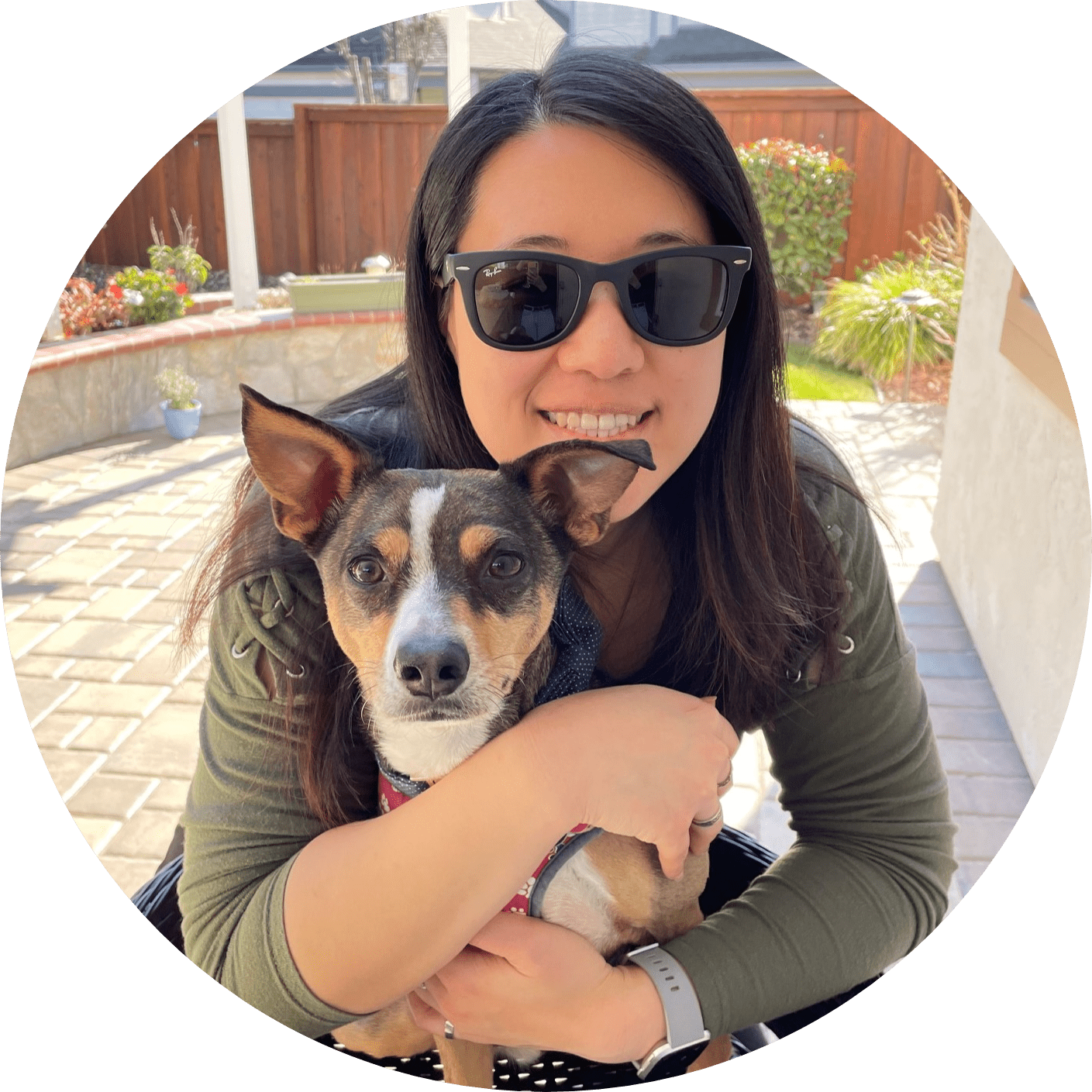
Dr. Sabrina Kong graduated from the Royal Veterinary College in England in 2016 and has been working at a small animal clinic in Northern California since then. She grew up in the Bay Area and got her bachelor’s degree from Cal Poly San Luis Obispo. She also became a Certified Canine Rehabilitation Practitioner through a program at the University of Tennessee.
When she isn’t in the clinic taking care of her four-legged patients, she enjoys traveling and trying new foods with her friends and her three-legged dog, Apollo. She adopted Apollo from her clinic when he was a puppy with numerous health issues. Dr. Kong truly cares about taking care of animals.

